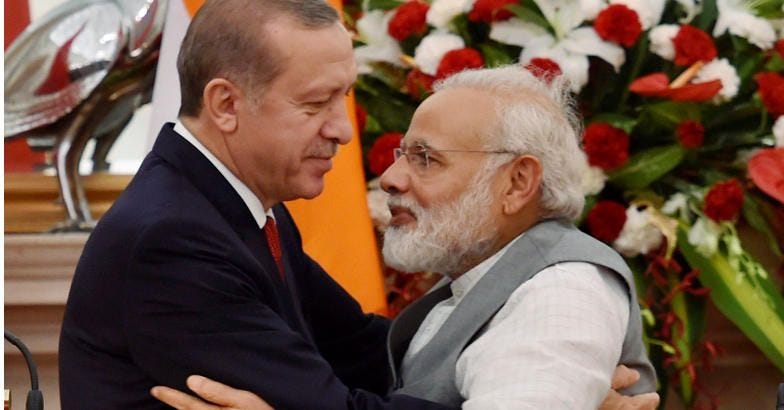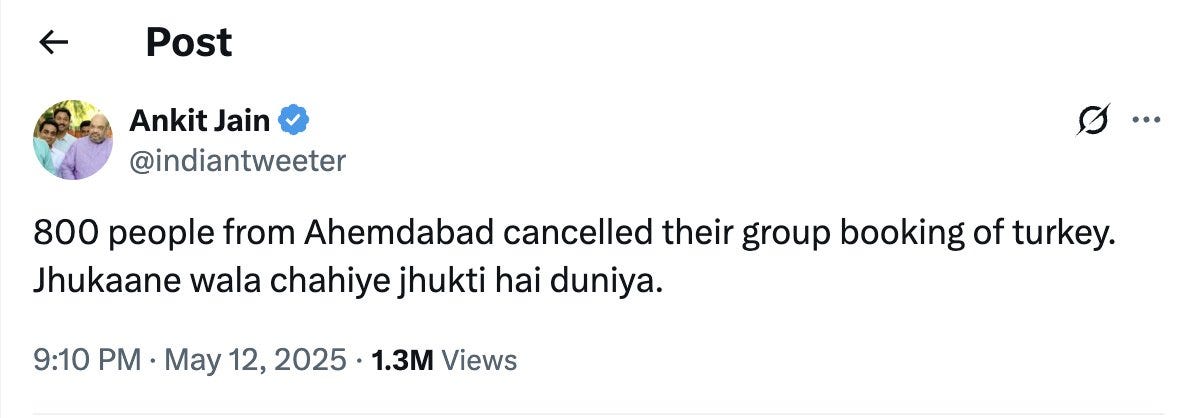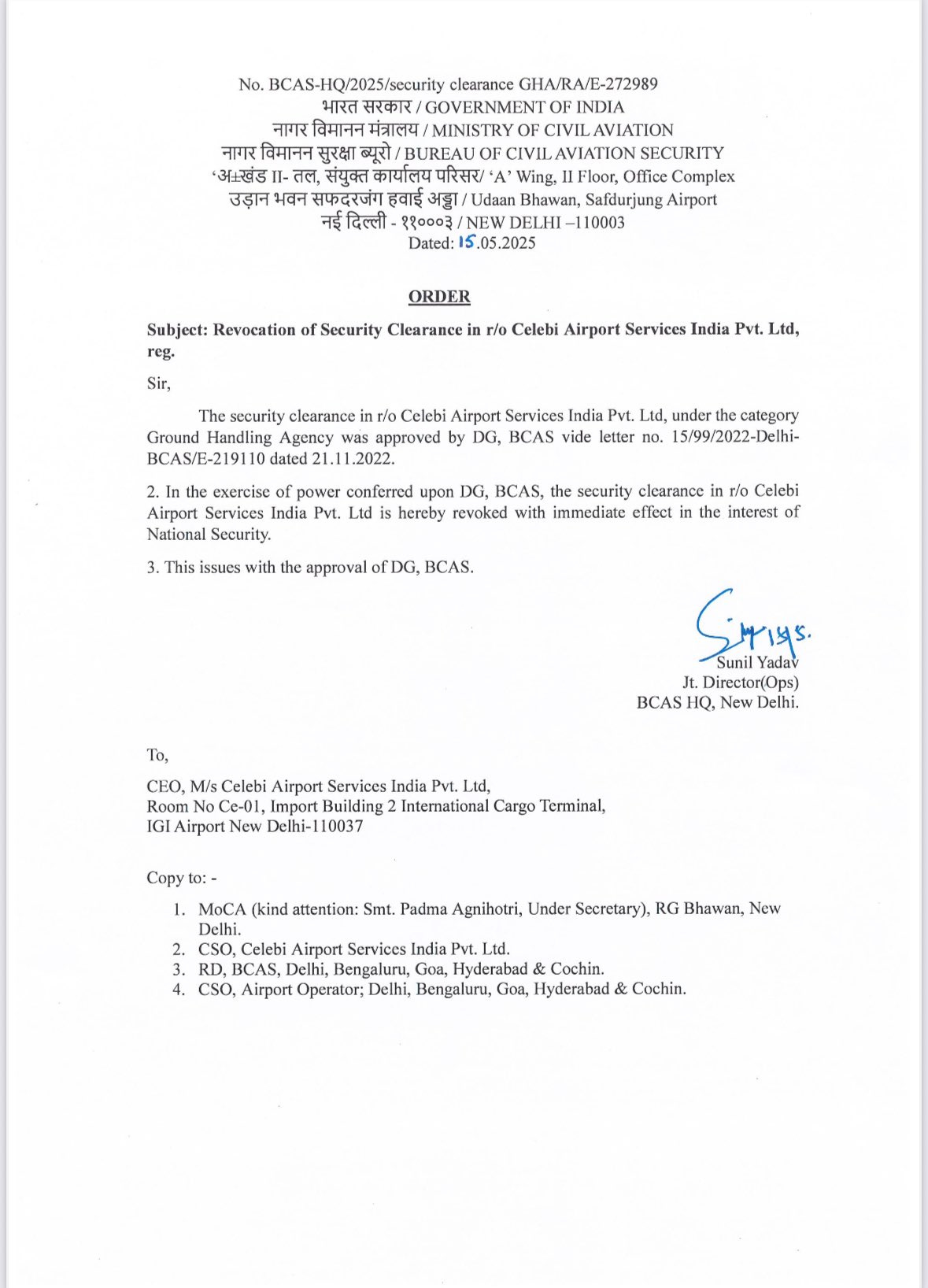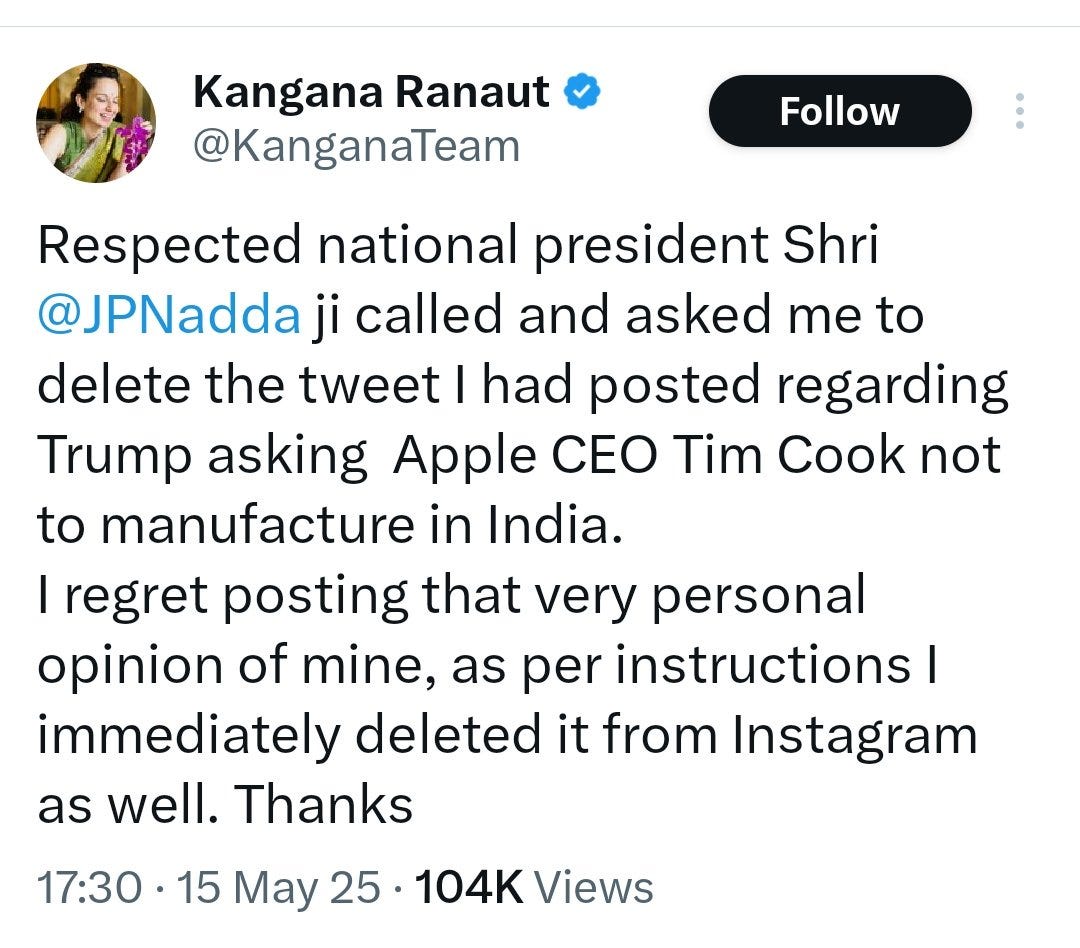Prime Minister Narendra Modi’s risible boast of a 56” chest is increasingly the perfect metaphor for the nation we are becoming — one that prides itself on a muscularity more imagined than real.
The latest manifestation of this comes from social media, which is currently preoccupied with driving a boycott of Turkey for its support of Pakistan. Among the many posts I saw on these lines, one stands out:
(This Ahmedabad group — were they planning on two charter planes, not to mention block-booking half the hotels in Istanbul? How did an 800-strong group plan to travel to Turkey anyway?)
Not to pour cold water on the collective enthusiasm for action, but here is some data you want to consider:
Per the most recent official figures, Turkey registered 49.2 million visitors in 2023 (and official estimates are that this could go up to 55 million in 2024, though final figures haven’t been tabulated and released.) In that year, tourism contributed 1.7 trillion Turkish lira to the country’s GDP, accounting for 3.7% of Turkey’s overall GDP. (All data via TurkStat and Statista).
The top five countries sending tourists to Turkey are, as of 2023, Russia (6.3 million), Germany (6.19 million), the UK (3.8 million); Bulgaria (2.89 million) and Iran (2.5 million).
India, in 2023, sent 0.33 million (330,000) tourists to that country. Which is to say, India contributed less than 1 percent (0.67%) to Turkey’s total tourist inflow. So much for the vainglory of the cheerleaders of the boycott-Turkey movement. (We’ve seen this before, in the case of Maldives, by the way — how long did that last?)
Look, boycott Turkey by all means — plenty of tourist destinations around the world to pick from. What I find ridiculous is this performative patriotism that has become the norm. (Selective performative patriotism, actually — China has provided more arms and material support to Pakistan than Turkey, but not a yip about that country from these same adrenalin-fueled super-patriots.)
This leads to the larger question: Why boycott Turkey anyway? Because, we are told, it backed Pakistan in the recently concluded Operation Sindhoor.
This, again, is part of the problem with a growing cult of jingoists whose collective memory seems to stretch only as far back as a day, or a week, prior — they have no sense of history, of context; their minds, such as they are, are consumed by the latest rage-bait electronic media and the BJP IT cell throws their way.
Here, as aide memoire, is a timeline-driven recap of Turkey-Pakistan relations (which predates Independence, by the way — as far back as the Turkish War of Independence (1919), the Khilafat Movement had sent financial aid to Mustaka Kemal Ataturk’s forces):
2 August 1947: Turkey was among the first countries to recognize Pakistan as an independent nation, establishing diplomatic relations as early as 2 August 1947, fully 12 days before Pakistan did in fact gain independence.
2 April 1954: Turkey and Pakistan signed the bilateral Treaty of Friendship and Cooperation, underlining their alignment with the Western bloc against Soviet influence. This agreement paved the way for deeper military collaboration, including Turkey training Pakistani air force personnel.
In 1972, Pakistan backed Turkey during the Cyprus crisis, and committed to send military assistance in Turkey’s face-off against Greece, if needed.
In 1980, Pakistan and Turkey signed a formal Defense Cooperation Agreement, aimed at enhancing military collaboration, including arms transfers. As a result, Turkey began upgrading Pakistan’s U.S.-supplied F-16 jets and French-supplied Agosta 90-B submarines.
Post-9/11, Turkey and Pakistan came closer together. The Pakistan-Afghanistan-Turkey Trilateral Summits (PATTS) were initiated to address Afghan security, with Turkey hosting peace talks. Defense cooperation expanded further, with Turkey training Pakistani forces and supplying equipment.
2009–2014: Turkey’s defense industry, led by firms like TUSAŞ and HAVELSAN, supported Pakistan’s military modernization. TUSAŞ upgraded 41 Pakistani F-16C/D fighters under a $75 million contract (2009–2014) while HAVELSAN established an Electronic Warfare Test and Training Range for the Pakistan Air Force in 2011 ($20 million).
2016: The Pakistan-Turkey High-Level Military Dialogue Group was formalized to coordinate defense projects and joint manufacturing of arms and equipment. This led to major arms deals in the coming years.
2018: Pakistan signed a $1.5 billion deal with Turkey’s ASFAT to acquire four MILGEM-class stealth corvettes, with two of them to be built in Karachi. The deal included technology transfer, to enhance Pakistan’s naval capabilities. Two corvettes, PNS Babur and PNS Khyber, were delivered in 2022, while two others, PNS Badr and PNS Tariq, beginning construction in Karachi.
2020–2023: Pakistan purchased Turkish Bayraktar TB2 and Akinci drones, bolstering its unmanned aerial capabilities. The TB2 was acquired for surveillance and combat while the Akinci, a high-altitude long-endurance UAV, was delivered to Pakistan in 2023, equipped for air-to-air and air-to-ground missions. During this period, Turkey became Pakistan’s second largest supplier of arms.
2021: A formal agreement was signed to co-produce arms, focusing on drones, missiles, and aircraft. Discussions included co-developing beyond-visual-range air-to-air missiles (e.g., Turkey’s Gokdogan) and a new helicopter.
2023: The 7th session of the Pakistan-Turkey High-Level Strategic Cooperation Council, co-chaired by Erdoğan and Pakistani PM Shehbaz Sharif, was held in Islamabad. Besides signing several MOUs to expand bilateral trade to $5 billion, Erdogan during this summit reaffirmed Turkey’s support for Pakistan’s stance on Kashmir, calling for a UN-led dialogue.
2024: At the 8th Pakistan-Turkey Industrial Expo Joint Working Group meeting, both nations discussed exporting Turkey’s KAAN fifth-generation fighter jet to Pakistan and establishing a joint factory. (AFAIK, those jets haven’t been delivered to Pakistan yet.)
Foreign policy and military experts can provide a lot more information and context, but even the brief recap above should drive the point home for the benefit of those now jumping up and down on social media: Pakistan-Turkey military relations are as old as Pakistan itself.
What, did you imagine that Pakistan Swiggy-ed a few Turkish drones and other weaponry just last week?
This leads to a related question: If Turkey’s vocal and material support for Pakistan is the provocation for hyper-nationalists to call for a tourism boycott, then what of the many meetings Modi has had, down the years, with Erdogan? Anti-national acts, all?
As the kids say these days, find someone to look at you the way Modi looks at Erdogan here:

You want irony? The headline for the story, which featured the above image, is:
Modi, Erdogan pitch for strong action against those who support terrorists
Getty Images thinks there have been 28 bilateral meetings between Erdogan and Modi down the years. I’m not sure about that, but from my digital archives, I could find the following:
November 15-16, 2015: G20 Summit, Antalya, Turkey: The two met on the sidelines of the summit, in one of the earliest interactions on record after Modi became PM (and Erdogan transitioned to the presidency). From the read out of that meeting, discussions supposedly focused on trade, counter-terrorism, and India’s bid for membership in the Nuclear Suppliers Group (NSG), which Turkey said it would support while simultaneously pitching for Pakistan also to be included.
2. September 4-5, 2016: G20 Summit, Hangzhou, China, where the two did a “pull-aside” meeting. Again, discussion reportedly centered on India’s NSG membership, with Modi seeking Turkey’s support.
May 1-2, 2017: Erdoğan made a two-day state visit to India, his first as Turkish President and second overall (he had visited in 2008 as Prime Minister). He was given a ceremonial welcome at Rashtrapati Bhavan by then President Pranab Mukherjee and Modi. In bilateral talks, the two leaders said they wanted to increase bilateral trade from $6.4 billion to $10 billion by 2020 (2020 has come and gone; bilateral trade is well short of that mark). Modi thanked Erdoğan for supporting India’s membership in the Missile Technology Control Regime (MTCR) and India’s application for the NSG. Erdoğan’s remarks on the eve of the visit, suggesting a “multilateral dialogue” to resolve the Kashmir issue, however had sparked controversy in India at the time.
• June 29, 2019: Modi and Erdoğan met on the sidelines of the G20 Summit in Osaka. In this first meeting after Modi’s re-election, the two discussed trade and investment, defense cooperation, counter-terrorism, IT, and civil aviation. Modi described Turkey as a “valued friend” and emphasized improving commerce and connectivity.September 16, 2022: Modi and Erdoğan held an unofficial meeting during the Shanghai Cooperation Organization (SCO) Summit, hosted by Uzbekistan. The meeting occurred amidst strained India-Turkey relations due to Erdoğan’s repeated comments on Kashmir at the UN General Assembly (e.g., in 2020 and 2022), which India countered by supporting Cyprus and Armenia in diplomatic forums. Described as an opportunity to “thaw cold Turkish-Indian relations,” the meeting signaled a willingness to engage despite differences.
September 10, 2023: G20 Summit, New Delhi, India, where the two held a bilateral meeting on the sidelines. Erdoğan described India as Turkey’s “greatest trade partner in South Asia” and thanked India for prompt relief under Operation Dost in the wake of the February 2023 earthquake in Turkey. He also expressed support for India’s bid for a permanent UN Security Council seat.
All of these meetings occurred despite India knowing full well that Erdogan’s Turkey stood four-square behind Pakistan; that Turkey was supplying arms to Pakistan on a regular basis; that Erdogan had repeatedly talked of internationalizing the Kashmir dispute.
Neither Modi nor his foreign minister has in the wake of Pahalgam said a word about Turkey and its support for Pakistan, far less take any quantifiable action against that country. But sure, let’s cancel a handful of flight tickets to Istanbul — that will show them who is boss.
And then there is this “useful idiot”, as always taking the lead in asking questions of the Opposition while deflecting, or ignoring, the fact that his own government refuses to answer any questions on anything at all:
Note that neither the Prime Minister nor the Foreign Minister has said a word about Turkey and its support for Pakistan, far less cut off diplomatic relations or taken any other concrete action. But sure, let’s question the Opposition on why it is not “aligning with public sentiment” — as measured, presumably, by the number of IT Cell trolls and their fellow travelers hyperventilating on the social media platform formerly known as Twitter.
All of this reminds me of something chess legend and political thinker Garry Kasparov recently posted on X:
The point of modern propaganda isn’t only to misinform or push an agenda — it is to exhaust your critical thinking, to annihilate truth.
That is Modi in a clinch with Erdogan (I remember my wife, after seeing a similar image with, IIRC, Macron, looked at me quizzically and asked “When last did you hug me like this?”).
An Economic Times story, from back in the day, ran with this headline: How PM Modi is rewriting diplomacy, one hug at a time. And in a particularly egregious display of sycophancy, TimesNow did an entire “story” under the headline From Moscow to Kyiv: The Tale of Modi’s Two Iconic Hugs And Their Diplomatic Significancy.
How are all those hugs working out for India, folks?
PostScript: Thanks to a Times of India editorial on leading versus leadering, I discovered the blogger Venkatesh Rao’s piece ToI cites, and which is worth reading in full. The money quote:
Leadering is the art of creating a self-serving account of whatever is already happening, and inserting yourself into it in a prominent role.
It is amusing to see Donald Trump continue to bring up his role in “mediating” the India-Pakistan conflict every day, on every occasion. Though it must be particularly galling for Modi — a grandmaster at ‘leadering’, to finally find himself at a loss when confronted by a guy who has elevated taking credit for things to a fine art.
PPS: Trump says he has told Tim Cook to not invest in India. This, when Piyush Goyal is poised to travel to the US to get a favorable trade deal.
PPPS: The US has just approved a $334 million arms sale to Turkey. So the US arms Turkey, Turkey arms Pakistan… and we cancel tourist tickets to Istanbul. Seriously, do we even realize the extent of the plight our country is in now?
PPPPS: This just in: Bureau of Civil Aviation Security has revoked the security clearance of Turkish ground handling services firm Celebi:
Why? Because Turkey backs Pakistan, and it is dangerous to have a company from that country handle multiple sensitive operations in major Indian airports.
Çelebi India, a subsidiary of Turkish aviation services firm Çelebi Aviation, has been a significant player in ground handling operations across major Indian airports. In September 2023, the company expanded its services to Chennai International Airport and with that, its footprint fell across nine key airports including Mumbai, Delhi, Bengaluru, Hyderabad, Cochin, Ahmedabad, Manohar International Airport, Mopa (Goa), and Kannur.
Okay, question: Since, as I pointed out above, Turkey’s military cooperation with Pakistan is as old as that country is, since Erdogan has constantly tried to drag the Kashmir issue from the bilateral to the multilateral table, since all of this is common knowledge, why was the firm given security clearance in the first place? Who took that decision, and why?
Tailpiece: Action:
Reaction:











There was a very apt meme response to the very first tweet you posted. It said something akin to "800 less towels and slippers shall be stolen from Turkish hotels" ..... :-)
Thank you for writing this, Prem. Been shaking my head at the boycott-as-performance drama that's been playing out (and applauded!) over the past couple of days.
Tickets to Azerbaijan and Turkey being cancelled in righteous rage, via phones and laptops manufactured in China. You can't make this stuff up.